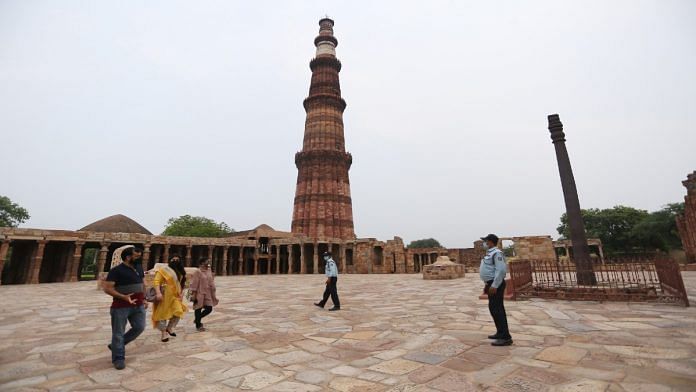New Delhi: Wrongs committed in the past cannot be the basis for disturbing present and future peace, a Delhi court said while rejecting a civil suit seeking restoration of Hindu and Jain deities and the right to worship within the Qutub Minar complex.
Asserting that “India has a rich history” and “has been ruled by numerous dynasties”, civil judge Neha Sharma at Saket court observed: “Nobody has denied that wrongs were committed in the past, but such wrongs cannot be the basis for disturbing peace of our present and future.
“Our country has a rich history and has seen challenging times. Nevertheless, history has to be accepted as a whole. Can the good be retained and bad be deleted from our history?” the court asked.
The judgment, dated 29 November, came on a suit filed on behalf of Hindu deity Lord Vishnu, Jain deity Tirthankar Lord Rishabh Dev, and others. The plaintiffs contended that Qutb-ud-din-Aibak had “dismantled, desecrated and damaged” Shree Vishnu Hari temple and 27 Jain and Hindu temples to then build the Quwwat Ul Islam Mosque in the Qutub Minar complex.
The plaintiffs had demanded restoration of deities within the temple complex. They had also sought a direction to the central government to frame a scheme of administration, and create a trust to manage the process of worship, and maintenance of the property.
Rejecting the suit, the court cited the verdict in the Babri Masjid-Ram Janmabhoomi dispute, where the apex court had observed, “Cognisant as we are of our history and of the need for the nation to confront it, Independence was a watershed moment to heal the wounds of the past. Historical wrongs cannot be remedied by the people taking the law in their own hands.”
Also Read: India’s top 5 revenue generating monuments were all built by Muslim rulers
‘No absolute right to restoration’
According to the order, the plaintiffs had relied on their rights under Articles 25 (freedom of conscience and free profession, practice and propagation of religion) and 26 (freedom to manage religious affairs) of the Constitution, and asserted that they have a “right to ensure that deities are restored at original place with due dignity”.
The court, however, said that the argument is “devoid of merit”, asserting that “fundamental rights enshrined under Articles 25 and 26 of the Constitution are not absolute in nature”.
It further observed, “It is an admitted fact that the suit property is a mosque built over temples and is not being used for any religious purpose, no prayers/namaz is being offered in the suit property.
“Hence, in my considered opinion, plaintiffs do not have an absolute right to restoration and worship in the suit property as public order which is an exception to Article 25 and 26 requires that status quo be maintained and protected monument be used for no religious purpose.”
The court pointed out that the mosque was declared a protected monument under the Ancient Monuments Preservation Act, 1904, in 1914. Therefore, it observed that its ownership lies with the government and the plaintiffs cannot demand restoration or a right to religious worship without challenging this notification itself.
It further referred to provisions of the Places of Worship Act, 1991, which says that “the religious character of a place of worship existing on the 15th day of August, 1947, shall continue to be the same as it existed on that day”.
“Hence, such ancient and historical monument cannot be used for some purpose which runs counter to its nature as a religious place of worship, but it can always be used for some other purpose which is not inconsistent with its religious character,” the court said.
“Hence, in my considered opinion, once a monument has been declared to be a protected monument and is owned by the government, the plaintiffs cannot insist that the place of worship must actually and actively be used for religious services,” the judge added.
(Edited by Gitanjali Das)
Also Read: Love after Covid – Delhi couples throng monuments, from Sunder Nursery to Qutub Minar



